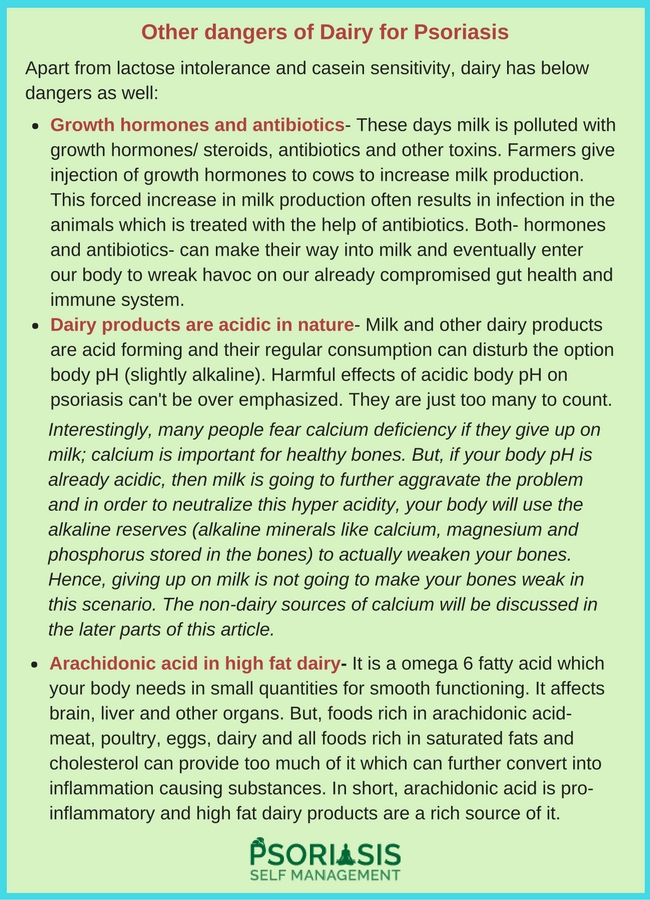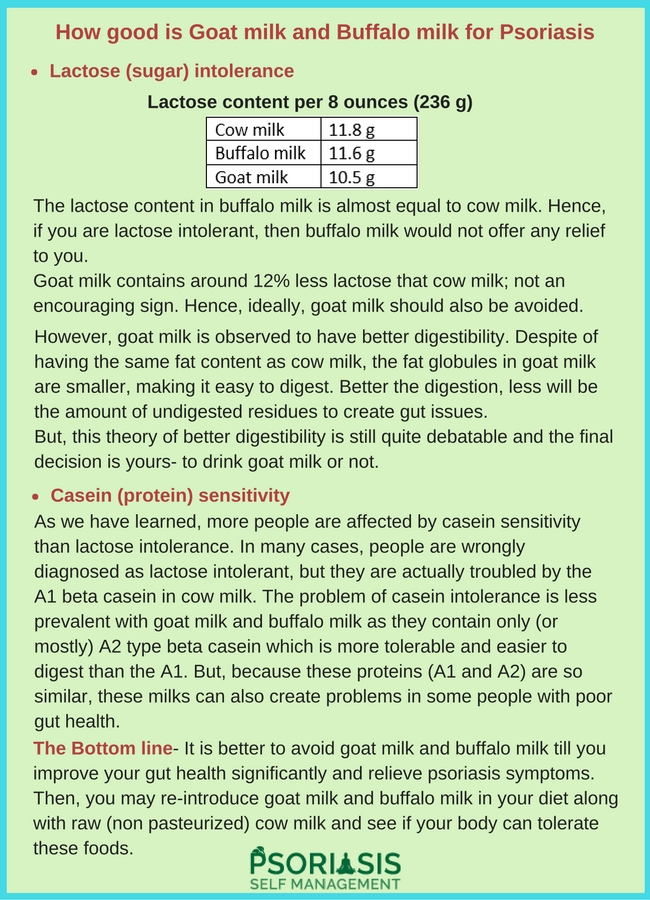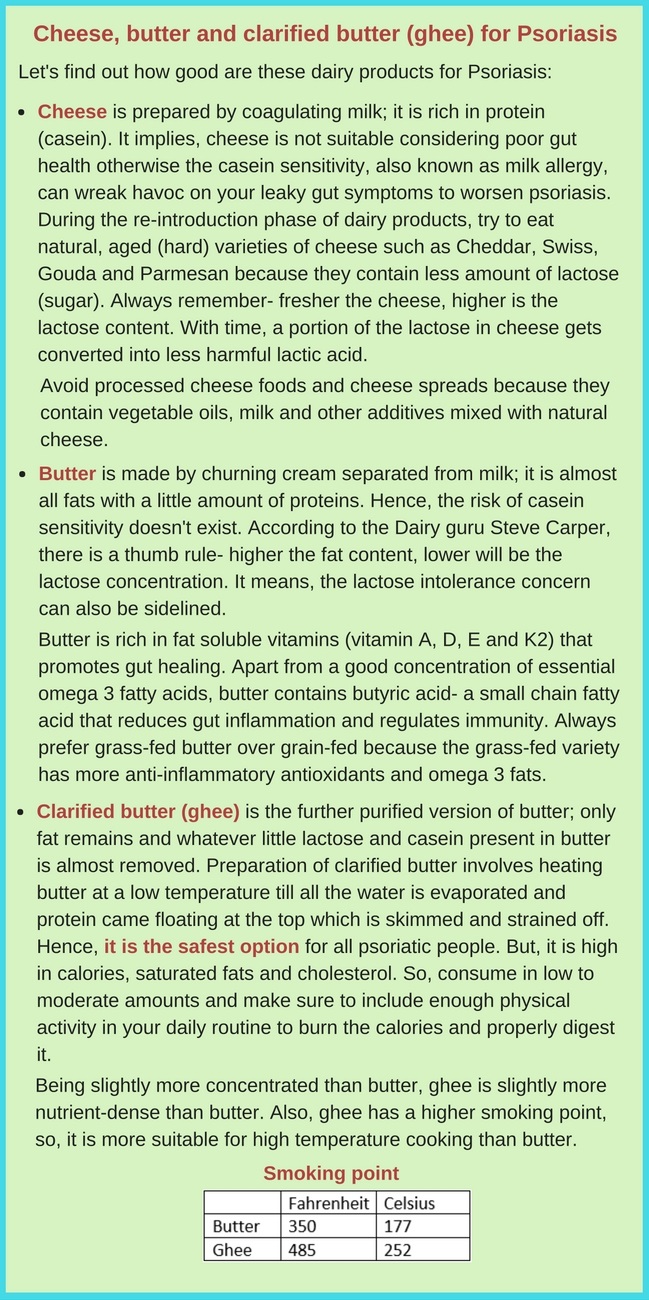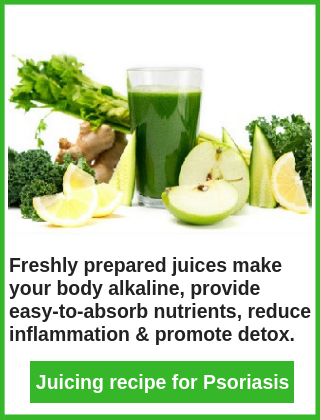After nightshades and gluten, the third most common food allergen that affects leaky gut is dairy- milk and milk products such as cheese and butter. Not all dairy products are bad; in fact, yogurt, kefir and buttermilk are beneficial to heal leaky gut. Also, clarified butter (ghee) can be helpful as well if consumed in moderate amounts along with a physically active lifestyle.
Psoriasis (and psoriatic arthritis) being an autoimmune disorder with leaky gut as the root of the problem, it is highly recommended to avoid dairy products (except yogurt, buttermilk and small amount of ghee) till you improve your skin health considerably. After significant progress in your skin health, you may consider re-introducing the dairy products in your diet one by one in small amounts to see if your gut health has improved good enough to digest the trouble making components of these dairy products without triggering your immune system.
The link between Leaky gut and Psoriasis
In psoriasis, the faulty immune system triggers uncontrolled growth of skin cells to develop psoriasis lesions on various parts of the body. The exact culprit for such a furious, uncontrolled immune system is unknown, however, the list of probable reasons includes:
- Chronic stress and anxiety
- Genetic (hereditary)
- Poor gut health- Chronic constipation, low level of healthy microbes in the gut, indigestion
- Unhealthy diet
- Poor lifestyle
- Heavy drinking (alcohol consumption)
- Overuse of antibiotics and steroids
- Skin injuries
- Infections such as strep throat
Any person dealing with psoriasis can be a victim of either one or many of the above reasons which lead to leaky gut.
Leaky means leakage and gut means the gastrointestinal tract- a long, hollow tube that starts at the mouth and ends at the anus. Think of the wall (lining) of the gut as a fine mesh that allow small molecules and nutrients to pass through and enter the blood stream. If the fine net structure of gut lining gets damaged to make the holes bigger, it is known as leaky gut. It will allow the toxins (undigested food particles, harmful gut microbes, heavy metals from contaminated drinking water and pesticides) to seep through and enter your blood stream and lymphatic system to pollute the delicate body environment.
Ideally, these toxins should be thrown out of your body through bowel movements, urination, sweating and breathing out. But, in case of leaky gut, they enter the blood stream and lymph to circulate throughout the body. The immune system is your body’s defense system that falsely recognizes such a heavy inflow of toxins as dangerously harmful and triggers an autoimmune response in the form of psoriasis and psoriatic arthritis symptoms.
In holistic (natural) healing of psoriasis, such a scenario is reversed by getting rid of the accumulated toxins from the body cells and then, improving the gut health by repairing the gut walls and infusing healthy gut microbes.
To achieve this target, you have to follow the below holistic healing protocol:
- Restricted, healthy diet
- Positive, active lifestyle
- Stress management
- Consuming relevant dietary supplements and natural herbs
- Using natural (herbal) topicals like shampoo, oils and creams. Warm soaking baths with Epsom salt (or Dead sea salt) also help.
Dairy and Psoriasis
People with a compromised gut health, as in case of psoriasis, are advised to stay away from dairy products till they improve their gut health significantly. According to Dr John Pagano, the author of the book Healing Psoriasis: The Natural Alternative, dairy is one of the most inflammatory foods in modern diet and it comes in the list of prohibited foods only after nightshades and gluten.
- Poor elimination (chronic constipation) is one of the trigger in many psoriatic people including myself and in case you don’t know, dairy products can worsen the constipation symptoms. The proteins found in dairy can paralyze the bowel and make it hard for you to poop. (1, 2)
- If you are dealing with psoriatic arthritis, then it becomes more important for you to get rid of pro-inflammatory foods like nightshades and dairy from your diet. In many cases, people experience great relief in pain, swelling and stiffness of body joints by eliminating the pro-inflammatory foods over a period of time.
- If you are troubled by respiratory system related issues like congestion, excessive mucus production, running nose and seasonal allergies- then avoiding dairy can bring great relief to you. The excessive mucus produced in your respiratory organs and intestines can harden to form a coating on the inner wall of intestines to cause constipation, gut inflammation and poor absorption of food nutrients.
Why dairy has such a bad reputation
The troublemaker components in milk and other dairy products are:
- Lactose (a type of sugar)
- Casein (a type of protein). Of the total protein content in cow’s milk- casein makes around 80% and it is hard to digest and process. Whey is just 20% and comparatively easier to digest.
Lactose intolerance
Milk contains lactose- a type of sugar. Your gut should have enough lactase enzyme to break down this sugar otherwise, it would have a hard time processing milk. Such a condition is known as lactose intolerance. Lactase deficiency can be permanent from birth or you may develop it with time, due to gastrointestinal upset. (3) Lactose is present in milk of all sources- cow, goat, sheet, buffalo and human. Hence, replacing one type of milk with another would not offer much help here. Lactose intolerance progresses with time because as we get older, the production of lactase enzymes decreases in our body. The undigested lactose residues ferment and rot in your gut to cause symptoms like bloating, gas, abdominal cramps, fat in stool, nausea and other gastrointestinal issues.
Lactose intolerance is less severe a matter of concern than casein sensitivity (discussed below). In fact, in many cases, people are misdiagnosed as lactose intolerant, but, they are casein sensitive actually.
Casein sensitivity
All types of milk contain casein- a type of complex protein, quite similar in molecular structure to gluten, that requires extra bit of effort to be digested properly.
More than 50% of people suffering from gluten intolerance are affected by the casein sensitivity as well because many times, undigested casein is mistakenly taken as gluten by the body to trigger auto-immune response. Hence, if you continue eating dairy without sorting out the gut issues, it would irritate and damage the gut linings to worsen leaky gut, inflammation and psoriasis. That’s why Casein is the second evil protein, next to gluten.
Among the various varieties of casein proteins in milk, the predominant one is beta casein. It makes around 30% of the total milk protein. The further variants of beta casein protein are A1 beta casein and A2 beta casein. The A1 beta casein is hard to digest and various research studies find it a gut irritant and pro-inflammatory in nature. (4, 5, 6, 7) Professor Keith Woodford, author of the book Devil in the Milk: Illness, Health, and the Politics of A1 and A2 Milk, says- “there are enough observational evidences that a lot of people can digest A2 beta casein, but not the A1. The troublemaker A1 can increase inflammation in the body which is root of most of the health problems from diabetes to heart problems to autoimmune disorders.” (8)
The proportion of A1 and A2 type proteins in milk depend on the breed of cow and type of animal (cow, goat, buffalo, sheep etc.). Milk from most of the USA, Western European and Australian origin cows have majority of A1 beta casein whereas cows from Asia, Africa and parts of southern Europe got A2 in predominance. If we go by breed, the high milk producing Holstein and Fresian cows have A1 whereas Jersey, Guernsey and most of the Asian and African breeds have A2 in high amounts.
Goat milk, buffalo milk and sheep milk contain only (or mostly) A2 casein. (9)
Hence, it can be suggested that drinking milk of A2 cow, goat, buffalo and sheep seems a safe bet. But, according to Dr Amy Myers, author of the book The Autoimmune Solution, A1 and A2 proteins are so similar in nature that A2 milk can also cause problems for people with compromised gut health.
Hence, better to avoid both A1 and A2 type milk and milk products till you sort out your gut issues. After that, slowly re-introduce small amount of A2 cow milk (raw, non-pasteurized), buffalo milk, goat milk and sheep milk. Observe the body’s response closely and gradually, increase the quantity.
In case you are thinking of soy milk, please note that all soy products including soy milk and tofu are to be avoided till your gut health is restored.

Various types (varieties) of milk
- Regular (pasteurized and homogenized)
Pasteurization simply means to cook/ heat milk at a higher temperature to destroy the harmful microbes so as to increase its shelf life and reduce the potential threats of infections. But, in the process of eliminating unhealthy microbes, most of the inherent beneficial bacteria and enzymes are killed off as well to make it more difficult to digest. Also, the level of nutrients goes down greatly. Hence, pasteurization actually worsens the problem of lactose intolerance and casein sensitivity even further. (10, 11) Moreover, pasteurization process further increases the acid forming tendency of cow milk which is already an acid forming food.
In most of the cases, the pasteurized milk goes through another mechanical process known as homogenization. It involves passing the milk through small holes at higher pressure to break down the large fat globules and spread them evenly so that they don’t settle at the top layer. You know, more the processing, lesser will be the nutritional profile.
- Raw (non-pasteurized and non-homogenized)- Recommended
Raw milk, as the name suggests, is non processed, pure milk. No loss of key nutrients, digestive enzymes and gut friendly bacteria because you drink it as it comes from the source animal. (12, 13) Hence, it is the most preferred form of milk for human consumption- highly nutritious, comparatively easier to digest and without any harmful additives. Once you feel confident with improved gut health, you can drink small amounts of raw milk (preferably A2 cow milk) every day and gradually increase the amount monitoring your body’s response.
- Organic
The term “organic” certifies that:
- the source animal is fed with grass, grains and other eatables that are grown using organic means- free from pesticides and chemical fertilizers.
- the source animal has not received any growth hormones, antibiotics or synthetic additives.
- the source animal has been provided enough access to the outdoors and good hygienic conditions.
It is obvious that the Organic milk is superior to regular (pasteurized) milk in terms of nutritional content. (14) But this difference is not huge because the organic milk also undergoes pasteurization (and homogenization) process. Hence, raw milk is still the best variety for optimum health benefits. (15)
- Skim milk
It is nothing but milk without fat- but we do need a certain amount of fat so that the water soluble vitamins like vitamin A and D present in milk can be absorbed. Without fat, skim milk is nothing but watery (fatless) milk sugar. Also, it is highly processed just like pasteurized milk- devoid of healthy bacteria, enzymes and nutrients. Hence, there is no use of consuming skim milk because it got nothing to resemble milk in true sense.

Fermented Dairy- Yogurt. Kefir and Buttermilk
Disturbed gut flora (lack of healthy gut bacteria) has a direct impact on the immune system and skin health and consuming fermented foods is a great way of infusing healthy gut bacteria (probiotics) into your body. (16) That’s why, fermented dairy products like yogurt, kefir and buttermilk are awesome.
The preparation of yogurt involves fermentation of milk; the live cultures (healthy bacteria) break down a part of lactose into lactic acid. Now you know why these bacteria in yogurt are also known as lactic acid bacteria.
According to Professor Dennis Savaiano from Honors College at Purdue University, yogurt bacteria (live cultures) contain a high level of lactase enzymes which helps break down lactose in the intestine. Hence, eating yogurt every day is like taking a digestive enzyme supplement on a daily basis. Many clinical trials have observed that people with lactose intolerance can eat significant amounts of yogurt every day without any signs of intolerance. (17, 18)
Apart from probiotics, yogurt is densely packed with nutrients, helps to maintain body weight and regulate body immunity. Also, natural fermented foods like yogurt help suppress the craving for refined sugar which is a big NO in holistic healing of psoriasis.
Dr Pagano also recommends eating yogurt for natural healing of psoriasis. The predigested (fermented) forms of dairy such as yogurt are among the healing foods mentioned in his book. Dr Pagano further recommended not to combine any kind of dairy products (including yogurt and buttermilk) with citrus fruits or their juices.
Buttermilk, prepared by blending 1 part of yogurt with 3 parts of water, is a natural probiotic drink- low in calories, saturated fats and rich in healthy gut bacteria. In Ayurveda, buttermilk, also known as takra, is the most robust, versatile and effective probiotic supplement for healthy digestion and disease free life. (19) According to Ayurveda, buttermilk is the poor man’s nectar- cheap, easy to make and good in taste. Drink buttermilk every day to stay away from diseases. It is widely recommended by Ayurveda health experts to treat irritable bowel syndrome, inflammatory bowel diseases and poor digestion.
I just love buttermilk! You can drink it plain or with some spices like roasted and grounded cumin powder, crushed curry leaves, chopped cilantro along with Himalayan pink salt. Don’t add sugar or peppers.
Homemade yogurt, buttermilk and kefir from raw milk (non pasteurized) is recommended. Do remember that most of commercially available fermented dairy products are made from pasteurized milk which may lack largely in healthy gut bacteria and nutrients.

Avoiding dairy and fear of calcium deficiency
Many people fear calcium deficiency if they have to avoid milk. First of all, milk is going to make you further deficient in vital minerals if your gut can’t digest it properly. Secondly, fermented dairy products can a provide decent amount of calcium without irritating your gut.
However, enlisted below is a brief list of non-dairy food stuffs with good calcium content:
- Sardine fish with bones
- Canned salmon
- Almonds
- Almond milk, coconut milk
- Spinach and most of the dark, leafy green vegetables
- Broccoli
- Kale
- Figs
- Oranges
- Sesame seeds, chia seeds
Final words and buying instructions
Avoid all dairy products except fermented varieties (yogurt, kefir and buttermilk) and a small amount of clarified butter (ghee) till you improve your gut health and psoriasis. Thereafter, re-introduce small amounts of raw milk (A2 milk) and related products such as old cheese and raw butter and notice how body responds to these foods. Gradually, increase the daily consumption without messing your gut health and of course, psoriasis.
You can purchase raw milk from any local small dairy or local farmers market and prepare your own homemade yogurt, kefir and buttermilk.
Preparing ghee (clarified butter) can be a tricky and troublesome process. So, you may check the below links of Amazon to get high quality, grass fed (or pasture raised) ghee:
| USA readers | India readers | UK readers | |
|---|---|---|---|
| Clarified Butter (Ghee) | Click here | Click here | Click here |


Is Skimmed milk okay to drink or for making tea ? There is now way to get “raw milk” here in USA. One can only get whole milk (3.25% fat), 2 %, 1% or 0% fat (skimmed milk) and all of these are pasteurized milk. also the yogurt at home can be made of these varieties only. we get lowfat yogurt in stores. can you suggest what kind of milk and yogurt should be consumed given the above ?